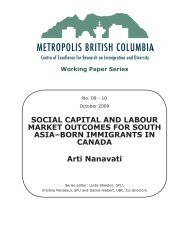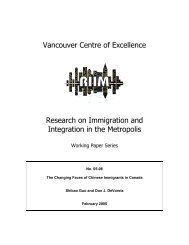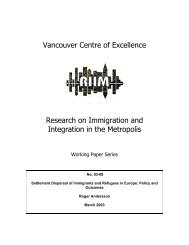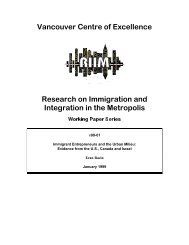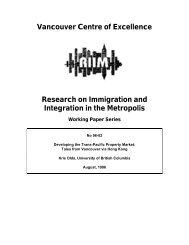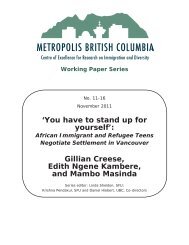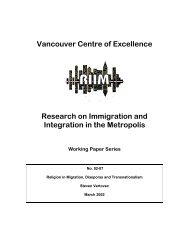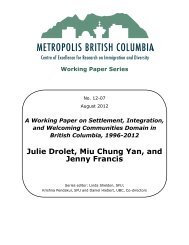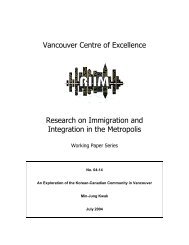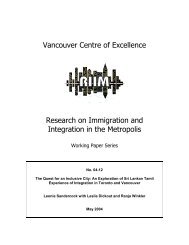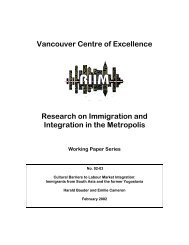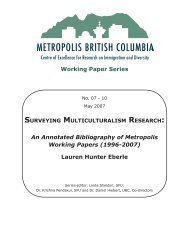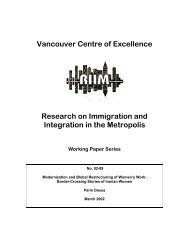Characteristics of Immigrant Transnationalism in ... - Metropolis BC
Characteristics of Immigrant Transnationalism in ... - Metropolis BC
Characteristics of Immigrant Transnationalism in ... - Metropolis BC
Create successful ePaper yourself
Turn your PDF publications into a flip-book with our unique Google optimized e-Paper software.
15<br />
across the Pacific. Punjabi-speakers tend to hold overseas property, while the fact that they receive few<br />
visitors probably reflects their recent settlement <strong>in</strong> Vancouver and their modest economic means. We<br />
also f<strong>in</strong>d that respondents who felt most comfortable participat<strong>in</strong>g <strong>in</strong> our survey <strong>in</strong> English tend to be<br />
the least transnational.<br />
Table 8: Transnational activities by home language<br />
Family Keep Travel Job Property Bus<strong>in</strong>ess Send $<br />
<strong>in</strong> home <strong>in</strong> to home requires <strong>in</strong> home <strong>in</strong> home to home<br />
number* country touch country travel country country country<br />
English only 330 83.0 92.3 66.0 9.2 9.2 1.2 9.1<br />
English & other 579 91.2 94.5 67.0 7.5 21.3 3.1 17.4<br />
Non-English 567 93.6 98.1 71.1 7.6 32.0 4.5 14.8<br />
Probability 0.000 0.000 0.189 0.167 0.000 0.027 0.003<br />
Does this mean that there is an acculturation effect visible <strong>in</strong> our results We have already seen<br />
that more settled immigrants participate <strong>in</strong> fewer forms <strong>of</strong> transnationalism (though travel is an<br />
exception). Table 8, which divides respondents by their home language, <strong>of</strong>fers some evidence on this<br />
po<strong>in</strong>t. Those respondents who speak a non-English language at home exclusively 9 engage <strong>in</strong> more<br />
<strong>in</strong>tensive transnationalism <strong>in</strong> terms <strong>of</strong> several <strong>of</strong> the activities explored <strong>in</strong> our survey: they keep more<br />
regular contact with family and friends, and are more apt to own property and bus<strong>in</strong>esses <strong>in</strong> their premigration<br />
country. Similarly, those who only speak English <strong>in</strong> their homes are the least transnational<br />
(though a high proportion receive visitors from abroad). However, a careful look at the data<br />
demonstrates that the relationship between home language and transnationalism is far from perfect.<br />
There is <strong>in</strong> fact no statistically significant difference between language groups and their propensity to<br />
travel to home countries either generally or for work. The question on remittances also yielded<br />
ambiguous results. Rather than show<strong>in</strong>g a straightforward acculturation effect, the language data may<br />
reflect the dist<strong>in</strong>ction between European immigrants (who have tended to embrace English as their<br />
home language) and immigrants from other parts <strong>of</strong> the world.<br />
8 It is notable that most <strong>of</strong> the migrants who have moved from India to Vancouver have come from the Punjab<br />
region (Walton-Roberts 2003); moreover, most are Jat caste, or farmers, which helps expla<strong>in</strong> their effort to reta<strong>in</strong><br />
ownership <strong>of</strong> property abroad (see Ba<strong>in</strong>s and Johnston 1995).<br />
9 Respondents were asked to name up to three languages rout<strong>in</strong>ely used <strong>in</strong> their household. Answers to these<br />
questions were coded <strong>in</strong>to the categories employed <strong>in</strong> Table 8.



